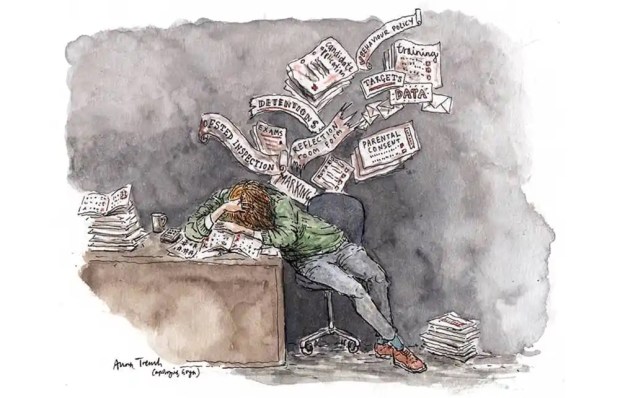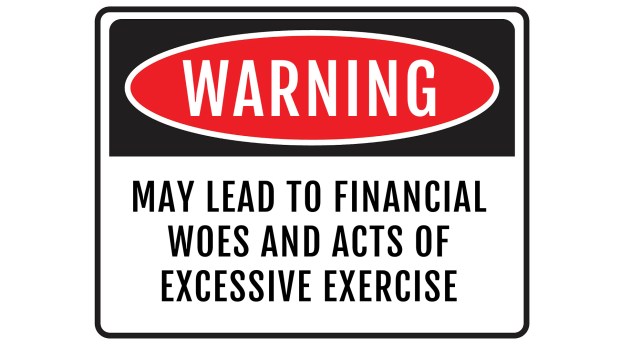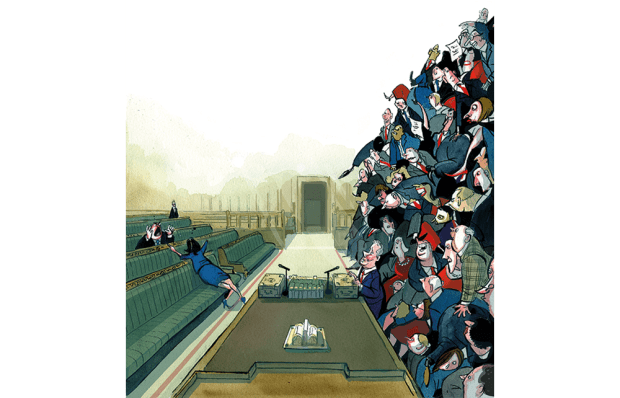Out of practice
Sir: GPs are not ‘hiding behind their telephones’ (Leading article, 4 September). In-person appointments are the core of general practice, and practices have been delivering millions of them throughout the pandemic. GPs share patients’ frustrations with the limitations of telephone consulting, which can often take longer than a face-to-face appointment, and with longer waits to be seen. However, as with other areas of the NHS, practices continue to follow national infection control guidance to keep patients and staff safe. You talk of pubs and nightclubs reopening — but how many nightclubs force very sick people, many of them elderly and living with a number of long-term illnesses, into a confined space at the same time? This is especially important as Covid continues to run rampant in the community.
Your article states GPs are seeing no more patients than before the pandemic. However in July, on top of the 25.5 million appointments booked, GP teams in England delivered 2.1 million Covid vaccinations. Meanwhile, between December 2019 and June this year, practices lost the equivalent of more than 1,000 full-time GP partners. The reality is fewer staff delivering more appointments to more people. Is it any wonder that practices feel under such pressure? It is unfair to lay the blame for this crisis at the door of dedicated individual GPs. To do so will have a lasting impact on staff morale, recruitment and retention, and ultimately, the doctor-patient relationship.
Dr Richard Vautrey
BMA GP committee chair, Leeds, W. Yorks
Army failures
Sir: What a fabulous diary from Andrew J. Bacevich (4 September). As a former British soldier for 24 years, I believe he is correct on every count about the lamentable state of the American political establishment and military, but the British army has nothing to boast about with Iraq or Afghanistan either. Our second-rate performance led to an embarrassment of senior officers promoted for failure. As usual, it was the poor soldiers and junior officers who suffered: all 457 who died.
Michael Wingert
High Wycombe, Bucks
The missing centre
Sir: I read Theo Hobson’s analysis of the Church of England with a feeling that something was missing (‘Blurred vision’, 4 September). In fact, three words made no appearance: God, Bible and Gospel. Is that not indicative of the real problem in any declining institution? Hobson describes a fight for the future of the Church of England that is more about the movement itself than what the movement is there for.
Chris Sinkinson
Moorlands College, Dorset
Great godfather
Sir: I enjoyed Fiona Mountford’s piece on the rise of the secular godparent (‘Born again’, 4 September), but if she is going to use the term ‘godparent’ then I think she should bring God into it somewhere. My bachelor godfather provided the eccentricity she likes, sending me a cigarette lighter when I was seven (‘I thought little boys liked playing with fire’) but I still have the prayer book he gave me when I was confirmed. We, too, drank things my parents didn’t — in our case it was Bull’s Blood, not vodka — but we also went to church together. He always observed the day I was christened rather than my birthday, giving me an extra day of celebration. ‘Secular’ just can’t cut it!
Tony Porter
Fleckney, Leics
In Bob we trust
Sir: Astute observer though he is of the manifold absurdities of the current era, Rod Liddle must not be allowed to get away with mocking Bob Dylan’s verse (‘The Nobel truth’, 4 September). Bob is the poet of our time. His poetry in its wit, wordplay and rhythm is on a par with that of T.S. Eliot and W.H. Auden. As for his musicality, only Stravinsky, perhaps, among modern composers comes anywhere near Bob in the driving intensity of his works. I challenge Rod to listen to ‘Like a Rolling Stone’, with its brilliantly insistent rhymes and irresistible pulsating beat, and then dare to deny his artistic genius. The Nobel Committee doesn’t always get it wrong.
Michael Lynch
Lutterworth, Leics
Public school paucity
Sir: Reading the review of Richard Beard’s Sad Little Men (Books, 4 September) made me consider some of my own character traits, also caused by my time at public school. Until relatively recently I did not think much about my removal from home at the age of eight, and have only latterly (thanks to my wife) begun to recognise the damage it did. It cauterised my ability to create emotional bonds. It taught me to close down my emotional response to people and situations. Of course the old prep and public schools were designed to produce men for a world, a Britain, that no longer exists. But modern, co-educational public schools are significantly more emotionally literate and humane places and I hope are producing rather fewer damaged individuals nowadays.
James Craven
Sherston, Wiltshire
Remembering Miss Judge
Sir: William Cook’s article about the person who I knew as Miss Judge, my art teacher, made my hair stand on end (‘Great expectations’, Spectator Schools). She gave me an A in my first school report at Aske’s in December 1958. This had an abiding effect throughout my life and still influences my arty hobbies at the age of 74.
In July this year there was to be an exhibition of Audrey Judge’s prints at the Haberdashers Old Girls’ reunion, but the meeting was cancelled, to my great disappointment. This article has gone some way to make up for this. Thank you, Mr Cook, for sharing your memories and for your tribute to a particularly kind teacher.
Sara MacIntosh, née Itzcovitz
(Haberdashers’ Aske’s, Hatcham 1958-65)
Darlington, Co. Durham
Got something to add? Join the discussion and comment below.
Get 10 issues for just $10
Subscribe to The Spectator Australia today for the next 10 magazine issues, plus full online access, for just $10.
You might disagree with half of it, but you’ll enjoy reading all of it. Try your first month for free, then just $2 a week for the remainder of your first year.














Comments
Don't miss out
Join the conversation with other Spectator Australia readers. Subscribe to leave a comment.
SUBSCRIBEAlready a subscriber? Log in